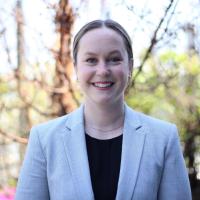PhD Student Candidates
2024 Cohort
Natalie Boychuk
Natalie Boychuk is interested in the social and structural determinants of postpartum complications and particularly the impact of social policies (such as paid family leave) on postpartum health outcomes. A secondary area of interest includes the influence of chronic gynecological conditions (PCOS, endometriosis, adenomyosis) on life course reproductive health. She received her MPH from Columbia Mailman, where she worked on a project revising WHO metrics for emergency obstetric and newborn care. She has spent the last two years working as a data analyst for Dr. Teresa Janevic, where she has worked on studies related to racism and postpartum cardiometabolic health, prediction modelling for postpartum hospital utilization, diabetes trajectories after gestational diabetes, and an evaluation of a community-based doula program. A proud Canadian, Natalie obtained her bachelor’s degree from the University of Toronto. In her free time, she loves to bake, explore the city with her partner Harry, and spend time with their cat, Shelby.
Research Interests
- Reproductive, Maternal, and Child Health
- Social Epidemiology
- Health Services
- Epidemiologic Methods

Stanford Chihuri
I am an epidemiologist with experience in patient and population-based research utilizing large database schemas. At Columbia University Medical Center, I helped design and conduct studies on substance use and injuries. My research focuses on the intersection of substance use, policies, and harm outcomes, such as injuries from motor vehicle crashes, falls, and self-harm, particularly among vulnerable populations like older adults, amputees, and pregnant women. I have guest-lectured on injury research methods at Columbia University and directed the Injury Lab at the Columbia University Center for Injury Science and Prevention.
Previously, I utilized statistical methods such as hierarchical modeling, longitudinal data analysis, and structural equation modeling to assist researchers investigating the health impacts of medication and product exposures. This includes studies on prenatal anesthesia exposure and neurodevelopmental outcomes, epidural use and maternal mortality and morbidity, and allogeneic blood transfusion and postoperative infections.
I hold an MPH in epidemiology with a certificate in advanced epidemiology from Columbia University Mailman School of Public Health. In my free time, I enjoy reading true-crime novels, cooking, playing soccer, and listening to podcasts.
Research Interests
- Substance Use and Substance Use Disorders
- Injury Prevention
- Research Methods

Edgar Ellis
I am interested in the associations between environmental exposures and cancer outcomes, with an emphasis on health disparities and medically underserved populations. Specific exposures include air pollution, pesticides/herbicides, heavy metals, and tobacco smoke. Cancer sites I would like to research include lung, prostate, and breast cancers. To investigate these associations in-depth, I am interested in learning life course and exposomic methods to understand the totality of environmental exposures on cancer risk, especially during windows of susceptibility, for high-risk and disparate populations. I earned my MPH in Epidemiology from the University of Arkansas for Medical Sciences and my BS in Chemistry from the University of Arkansas. I enjoy reading, playing tennis and golf, visiting museums, and traveling."

Nora Kelsall
My research interests revolve around the interplay of adolescent mental health, suicidality, and global health. I’m especially interested in using novel data sources such as online data in combination with large epidemiological datasets to see how social environment plays a role in risk for suicide. I hold a bachelor's degree in Mechanical Engineering from Massachusetts Institute of Technology, and a Master’s in Science of Epidemiology from Harvard T.H. Chan School of Public Health. Outside of my research I enjoy biking, going to concerts with friends, and playing with my cats.

Nodar Kipshidze
I am passionate about understanding the drivers of disease persistence and the interplay of factors such as population immunity, human mobility, health inequities, and behavior in promoting disease persistence. My research focuses on linking these theoretical questions to real-world applications, optimizing public health interventions to reduce the burden of various infectious diseases. To achieve this, I employ a range of mathematical, statistical, and spatial models. Over the past year, I have held a dual appointment, dividing my time between the Yale School of Public Health as a postgraduate associate and the One Health Trust as a senior research analyst. At Yale, I have been evaluating the cost-effectiveness of different vaccine interventions for typhoid outbreaks. At the One Health Trust, I have continued my work on mpox persistence in the U.S., while also expanding my research to include evaluating the long-term impacts of doxycycline as post-exposure prophylaxis (PEP) on bystander bacterial populations, modeling human behavior in mechanistic and agent-based models, and forecasting flu pandemics. Before my current roles, I spent nearly a decade in industry, leading global clinical programs for various biomedical start-ups. I hold an MS in Epidemiology from Columbia University (2023), an MPH in Global Health from NYU (2017), and a BA in English from Franklin & Marshall College (2014). My hobbies include distance running, hiking, and cooking.

Shanyah Mitchell
I obtained my MPH in Epidemiology from Columbia University in 2024 with a certificate in Infectious Disease Epidemiology, and hold a BA in Biological Sciences with a concentration in Microbiology and Classics from Cornell University. I am interested in examining the role care access plays in the incidence of infectious diseases. More specifically, I am interested in the impact access to prevention and treatment methods for disease has on individual health, and community level outcomes such as transmission and outbreak mitigation, as well as understanding the factors that exacerbate unequal disease burden in a population.

2023 Cohort
Calvin Colvin
I am a first-year pre-doctoral candidate in the Epidemiology PhD program. I hold a BA in Sociology (2017) and an MSPH in Applied Epidemiology (2019) from the University of Alabama at Birmingham. Prior to joining the PhD program, I worked as a researcher in the Department of Epidemiology at the University of Alabama at Birmingham. In this role, I analyzed data from prospective cohort studies of cardiovascular disease, including the Jackson Heart Study and the REasons for Geographic and Racial Differences in Stroke study. In addition, I worked as a data analyst in the Department of Population Health at the NYU Grossman School of Medicine, where I developed data collection tools for several global health implementation science studies. Currently, I am a member of Dr. Adina Zeki Al Hazzouri's research group and contribute to her work that examines the role of financial security in cognitive aging.

Alexander Furuya
I am a Columbia University graduate student pursuing a PhD in Epidemiology at the Mailman School of Public Health. I have an extensive background in data analysis, statistical programming, and public health research. My goal is to understand social determinants of health among those in the LGBTQ+ community and immigrant communities, and I hope to identify effective interventions to improve health.
I currently work with Dr. Dustin Duncan in analyzing data form the Trying to Understand Relationships, Networks and Neighborhoods in Trans women of color (TURNNT) Cohort. Specifically, I am looking into determinants of HIV prevention and treatment and identifying factors that affect them.
Research Interests
- Social Epidemiology
- LGBTQ+ Health
- Health of the Aging Community
- Intervention Science
- HIV Treatment and Prevention
- Biostatistical Methodologies
- Chronic Disease Epidemiology

Michelle Lui
I am a first year pre-doctoral candidate in the department of Epidemiology and am funded by the Advanced Training in Environmental Health and Data Science Training Program. I received my BA in Public Health and Molecular and Cell Biology from the University of California, Berkeley in 2019, and my MPH in Epidemiology with a Certificate in Applied Biostatistics and Public Health Data Science from the Columbia University Mailman School of Public Health in 2021. Prior to beginning my doctoral training, I worked as a research associate at Memorial Sloan Kettering Cancer Center where I helped conduct research on smoking cessation among cancer patients. Currently I am working with Dr. Parisa Tehranifar to examine predictors and disparities in cancer screening, with a focus on breast cancer screening. I am also working with Dr. Mary Beth Terry to study the gene-environment interactions for polycyclic aromatic hydrocarbons and breast cancer.

Elise Mara
I am a first year doctoral student, first year fellow on the Global HIV Implementation Science Research Training Fellowship with ICAP, and an infectious disease epidemiologist. I received a BS in Biological Sciences from the University of Michigan-Dearborn in 2014, an MPH in Epidemiological Methods and Applications from the University of Michigan in 2016, and prior to coming to Columbia, spent about seven years at the San Francisco Department of Public Health in the HIV Epidemiology Section. My research interests are centered around infectious disease prevention and treatment interventions, and I have past work pertaining to HIV care navigation, hepatitis C treatment, mpox vaccination, and COVID-19 coinfection among people with HIV. Apart from my role as an analyst, as a database administrator and developer, I designed, carried out, and evaluated a surveillance system modernization project to increase the accuracy, timeliness, and accessibility of HIV test results for department case investigators and outreach staff. My current projects relate to PrEP demand creation among women in South Africa and HIV care retention patterns in Côte d'Ivoire.
Research Interests
- Infectious Disease
- Health Interventions
- Implementation Science
- HIV
- Global Health

Marco Thimm-Kaiser
I am a first-year pre-doctoral candidate and a graduate research assistant in the Department of Epidemiology. My research focuses on psychiatric and social epidemiology, with an emphasis on health and wellbeing during adolescence and young adulthood. I am particularly interested in novel, multidimensional approaches for measuring social contexts and methods for modeling their impact on changing patterns of mental health and health behavior. I also have a background in research on health promotion in the U.S. Latino community, pragmatic community trials of family-based interventions to mitigate the impacts of harmful social determinants of health, and the prevention of HIV and STIs. I received a BA in Economics and an MPH in Epidemiology and Biostatistics from the City University of New York (CUNY), and I have held research positions at Johns Hopkins, Duke, and New York University.

Adam Whalen
I am a first-year pre-doctoral candidate in Epidemiology and a pre-doctoral fellow in the Advanced Training in Environmental Health and Data Science Training Program, jointly managed through the Department of Epidemiology and the Environmental Health Sciences Department. I received my BS in Biology and Public Health Science in 2015 from Santa Clara University, and my MPH in Epidemiology with a Certificate in Applied Biostatistics and Public Health Data Science from the Columbia University Mailman School of Public Health in 2021. Previously, I worked as a data analyst at the Department of Epidemiology and Population Health at the Albert Einstein College of Medicine, working on research projects related to Hispanic/Latino health as well as women living with HIV. As a member of the Spatial Epidemiology Lab at Columbia, my current research investigates how discrimination against transgender women of color and sexual minority men affects health outcomes. I also examine activity space exposure to different features of the bult and social environment and how they influence criminal legal system involvement, sleep, access to gender-affirming health care, and other outcomes. My research interests include social and spatial epidemiology, novel spatiotemporal methods including GPS-based activity space analysis and geofencing applications, injury and violence outcomes such as transportation and police violence, and sexual and gender minority health.
Research Interests
- Social Epidemiology
- Spatial Methods
- Injury/Violence
- Transportation
- Police violence
- Sexual and Gender Minority Health

Siddhesh Zadey
Siddhesh (Sid) Zadey is a Doctoral Student in Epidemiology at Columbia University with Graduate Research Assistantships with Dr. Chris Morrison (The GAPS Lab) and Prof. Charles Branas (CCISP). He is interested in how alcohol use, self-harm behaviors, and firearm violence are related. He is also a Co-founder of the non-profit think-and-do tank - Association for Socially Applicable Research (ASAR) based in India, a Research Affiliate for Global Surgery at the Duke GEMINI Research Center, and an Adjunct Research Faculty at Dr. D. Y. Patil University, Pune, India. He has an integrated BSMS in Natural Sciences with a focus in Neuroscience from the Indian Institute of Science Education and Research (IISER) Pune, India, and an MS in Global Health from the Duke Global Health Institute US. He has previously worked at the Departments of Surgery and Emergency Medicine at Duke University School of Medicine and has been trained at the Berenson Allen Center for Noninvasive Brain Stimulation, Harvard Medical School. At ASAR, he focuses on health systems modeling and population-level health disparities. At Duke, he worked on investigating access to surgery in rural India, low-cost gasless laparoscopy innovations for in low-income countries, and building the alcohol use behavioral phenotyping test (AUBPT) for testing in global populations. Currently, he serves as the Chair of the SOTA Care in South Asia Working Group of the G4 Alliance, a Fellow for the Lancet Citizens' Commission for Reimagining India's Health System, and a member of the Drafting Committee for the Maharashtra State Mental Health Policy. He is a part of the Global Burden of Disease Collaborators Network, Mental Health Innovation Network, and Global Mental Health Action Network. In 2021, he served as a member of the Indian Academy of Pediatrics COVID-19 Task Force for School Reopening. His work has been published in The Lancet, JAMA Surgery, Lancet Global Health, Lancet Regional Health Southeast Asia, and BMJ Global Health, among others. He has written for Think Global Health, Harvard Public Health Magazine, BMJ Opinion, The Wire, The Hindu, and Hindustan Times. He was awarded the prestigious Consortium of Universities for Global Health's Young Leader Award (under 30) in 2022 and was inducted into the inaugural cohort of '40 under 40' in Public Health Catalyst of the Boston Congress of Public Health.

2022 Cohort
Erin M. Annunziato
I am a pre-doctoral fellow in the Substance Abuse Epidemiology T32 Training Program. I am interested in structural-level determinants contributing to substance use-related harms, including racial and ethnic disparities in substance use treatment and drug-related legal outcomes. My current research examines relationships between 1) state policies, such as drug monitoring programs, and legal outcomes, and 2) racial and ethnic disparities in substance use treatment access through the criminal legal system. I have a BS in Biology from Boston College and an MPH in Epidemiology from the Mailman School of Public Health.
Research Interests
- Drug policy
- Drug criminalization
- Racial and ethnic disparities
- Social epidemiology

Lina Demis
I am a second year pre-doctoral candidate in Epidemiology and a second year pre-doctoral fellow in the Advanced Training in Environmental Health and Data Science Training Program, jointly managed through the Department of Epidemiology and the Environmental Health Sciences Department. I earned a BS in Biology from Brooklyn College (CUNY) in 2019, and an MPH in Epidemiology with an Advanced Certificate in Public Health and Humanitarian Action from the Columbia University Mailman School of Public Health in 2021. Previously, I served as a clinical research coordinator at the NYU Grossman School of Medicine, Department of Neurology, where I managed all aspects of research and administration for the Stroke Division. My previous research has focused on a range of mental, neurological, and substance use issues in humanitarian settings. As a doctoral student, my research efforts are focused on evaluating neurodevelopmental outcomes amidst the complex landscape of mental health and substance use among adolescents and their caregivers in diverse conflict-affected settings. My research interests include global mental health, substance use epidemiology, child development, and disability advocacy.
Research Interests
- Global Mental Health
- Substance Use Epidemiology
- Child Development
- Disability Advocacy

Nicole Itzkowitz
I am a 2nd year PhD student in the Department of Epidemiology and a pre-doctoral fellow in the Advanced Training in Environmental Health and Data Science T32 Training Program. I entered the program in 2022 with an MSc in epidemiology from The London School of Hygiene and Tropical Medicine and a BA in public health from the University of Rochester. My research interests are broadly concerned with quantifying urban environmental and built environment exposures and exploring their relationship with injury and other non-communicable disease outcomes. My previous work at Imperial College focused on examining the causal relationship between acute noise pollution exposure and cardiovascular disease hospitalizations and creating a composite metric to estimate smoking behavior at small spatial resolutions. I am currently working with Dr. Andrew Rundle and the Built Environment and Health research group on several projects related to pedestrian and micromobility injuries and fatalities in the context of the built environment and alcohol use.
Research Interests
- Environmental Exposures
- Built Environment
- Spatial Methods
- GIS
- Injury
- Non-communicable Disease

German Rivera-Castellar
I started my PhD in Epidemiology in 2022 after finishing my MPH at New York University GPH. Before moving to NYC, I completed a MS in research and evaluation of health systems and a BS in industrial microbiology at the University of Puerto Rico. Previously, I have worked in evaluation of CDC funded public health programs at UPR Comprehensive Cancer Center, knowledge management at UNICEF HIV/AIDS section, and research regarding HIV/AIDS in Puerto Rico and vaccination hesitancy amongst PWID. Currently, I am a fellow in T32 Social Determinants of HIV and my research interest include disparities in HIV amongst racial and ethnic minorities as we as sexual and gender minorities. My current work also addresses changes in the gut microbiome and its effect in the body.
Research Interests
- HIV/AIDS
- Microbiome
- Racial and Ethnic Disparities
- Social Epidemiology
- Sexual and Gender Minorities
- Spatial Epidemiology

Michelle Smith
I am a second-year PhD student specializing in Epidemiology at the Mailman School of Public Health. I am also a Lead Teaching Fellow at the Center for Teaching and Learning, and am a Trainee Associate Member of the Herbert Irving Comprehensive Cancer Center. I received my BS in Biology from Stony Brook University and my MPH in Epidemiology from SUNY Downstate Health Sciences University. My professional experience spans medical research in start-up companies, academic hospitals and research centers. Previously, I worked in start-up companies geared towards cancer outcomes and precision medicine where I focused on data abstraction and analysis of breast, colorectal and lung cancers using electronic medical records. I contributed to research at Memorial Sloan Kettering Cancer Center on integrative medicine techniques addressing chemo-induced neuropathy, and administratively managed multiple projects at the Feinstein Institutes for Medical Research, encompassing population health, neurosurgery, and Alzheimer’s disease research. At SUNY Downstate, I began research on adverse pregnancy outcomes and social determinants of health (SDOH) among predominantly Caribbean and African communities in Brooklyn. My current research focuses on examining the nuances of the breast cancer tumor microenvironment, particularly around pregnancy and hormonal shifts. This work involves spatial analysis, T-cell distribution, proteomics and traditional epidemiologic methods.
Research Interests
- Breast Cancer
- Cancers of the Reproductive System
- Environmental Exposures
- Endocrine Disrupting Chemicals
- Machine Learning
- Digital and Computational Pathology
- Social Determinants of Health (SDOH)
- Health Disparities

Sara Wallach
I am a second-year pre-doctoral candidate in Epidemiology and a second-year pre-doctoral fellow in the Global HIV Implementation Science Research Training Fellowship. I received my BA in Anthropology and Global Public Health from New York University and my MPH, with a focus on the evaluation of international health programs, from Johns Hopkins Bloomberg School of Public Health. In my work with the New Jersey Department of Health and the U.S. Centers for Disease Control and Prevention, Zimbabwe Office, I implemented, managed, and evaluated large-scale HIV programs. My research currently focuses on using novel epidemiologic methods to evaluate the impact of HIV programs using routinely collected data. I also perform research to determine drivers of HIV acquisition and opportunities for prevention in various contexts and populations using population-based HIV impact assessments and other data sources. My research interests include HIV, implementation science, health and human rights, LGBTQ+ health, and infectious diseases.
Research Interests
- HIV
- Implementation Science
- Evaluation
- Health and Human Rights
- LGBTQ+ Health
- Infectious Diseases

John Wetmore
John Wetmore began his PhD studies in the Department of Epidemiology in Fall 2022. Previously, he earned a master’s of public health in epidemiology & biostatistics from the CUNY School of Public Health and a bachelor of art’s degree in psychology and classical studies from Macaulay Honors College at Hunter College. He is a Graduate Research Assistant at the at the Gertrude H. Sergievsky Center, Columbia University Irving Medical Center. Wetmore’s research interests include the psychosocial impacts of neurological disorders, genetic and behavioral interventions, and health disparities. He has conducted research to determine how Latinos respond to learning their genetic risk for Alzheimer’s disease, to understand the psychosocial impacts of living with epilepsy, and to validate clinical rating scales for use in patients with Parkinson’s disease.

2021 Cohort
Dana Bezuidenhout
I am a third-year pre-doctoral candidate in Epidemiology and a pre-doctoral fellow in the Global HIV Implementation Science Research Training Fellowship. I received my BA in Biology, Society, and the Environment from the University of Minnesota – Twin Cities in 2016 and my MPH, focusing on Epidemiology and Global Health, from Columbia University Mailman School of Public Health in 2018. Previously I worked as a project manager and epidemiologist at The Foundation for Professional Development in East London, South Africa, working on tuberculosis (TB) point-of-care diagnostics, TB stigma, and HIV prevention interventions for adolescent girls and young women. My research currently focuses on incorporating spatial and genomic data as an innovative way to understand community TB transmission and to inform active case-finding strategies in TB-endemic settings. I also perform research assessing the impact of diabetes on TB treatment outcomes. My research interests include TB transmission, spatial epidemiology, and implementation science.
Research Interests
- Tuberculosis Transmission
- Spatial Epidemiology
- Implementation Science

Sarah Forthal
I am a PhD candidate and pre-doctoral fellow in the T32 Psychiatric Epidemiology Training Program at the Mailman School of Public Health. I am also a biostatistical analyst with the Global Psychiatric Epidemiology Group at the New York State Psychiatric Institute. I received an MPH in epidemiology from Mailman in 2019 and a BA in political science and statistics from Columbia’s undergraduate college in 2015. My core research interests include identifying mental health-protective factors following exposure to traumatic events, global mental health, intervention evaluation, and research with Multiracial populations. My current projects include investigating the role of parental social support in intergenerational trauma transmission, understanding depression risk in Multiracial American adults, developing an accessible guide to Single World Intervention Graphs, and co-authoring a book chapter on the health of Multiracial youth. Prior to entering the PhD program, I held research positions at the Partnership to End Addiction and Columbia-World Health Organization Center for Global Mental Health.

Catherine Gimbrone
My research focuses on policy impacts and social disparities within psychiatric epidemiology. I'm passionate about exploring related areas and have been involved in a wide range of projects. These include studies on reproductive health policy, firearm legislation, naloxone access laws, adolescent political beliefs, and suicide trend forecasting. My goal is to identify emerging mental health trends among vulnerable populations, to help improve treatment efforts and inform policy decisions. I've co-authored several publications and enjoy using my skills in statistics to deepen my understanding of these complex issues. I graduated with an MPH from Columbia University in 2020 and, in a past life, worked in filmmaking and fashion.
Research Interests
- Psychiatric Epidemiology
- Policy Research
- Reproductive Health
- Adolescence

Anton Kociolek
I am a third-year pre-doctoral candidate in Epidemiology and a graduate research assistant at the Taub Institute for Research on Alzheimer's Disease and the Aging Brain. In 2014, I received my BA in Anthropology from the City University of New York and in 2017 received my MA in Anthropology from the same institution, with a focus on historical anthropology of the Caribbean. I received my MS in Epidemiology from the Columbia Mailman School of Public Health in 2020. Prior to entering the Doctoral program in Epidemiology at Mailman, I worked as a study coordinator for Dr. Yaakov Stern at the Taub Institute, working on observational cohort studies of late-onset Alzheimer's Disease. My research focuses on investigating the relationships between underlying neuropathological processes and clinical signs in Alzheimer's Disease and the application of causal inference and machine learning methods to dementia research. My research interests include dementia and aging, neuroepidemiology, biomarker development and validation, causal inference, and machine learning.
Research Interests
- Alzheimer's Disease
- Dementia
- Movement disorders
- Aging
- Neuroepidemiology
- Causal Inference
- Machine Learning

Megan Marziali
I am a 3rd-year PhD Candidate in the Department of Epidemiology and a pre-doctoral fellow in the NIDA-funded T32 Substance Abuse Epidemiology Training Program (SAETP). I received my BSc in Microbiology and Immunology from the University of British Columbia in 2018 and my MPH in Epidemiology with a certificate in Advanced Epidemiology from the Columbia University Mailman School of Public Health in 2021. My research focuses on substance use, including polysubstance use, fatal and nonfatal overdose, social networks, and psychosocial factors (e.g., loneliness). My work is often situated at the intersection of substance use and HIV. In addition, I perform research exploring the impact of various social and substance use policies on substance use outcomes.
Research Interests
- Substance Use Epidemiology
- HIV
- Social Networks
- Social Determinants of Health
- Social Policies
- Substance Use Policies

Hoisum Nguyen
Inspired by the stories of immigrants and social justice movements in the United States, Hoisum's research centralizes psychiatric and mental health outcomes with a particular focus on trauma and violence as it relates to firearms, racial/ethnic populations, LGBQIA+ communities, and financial means. Equipped with prior training in causal theories from UCLA (2021-2023), Hoisum hopes to create research of consequence for policy formulation. Hoisum is also a Robert Wood Johnson Health Policy Research Scholar receiving health policy and leadership training from Johns Hopkins University (Class of 2026).
Research Interests
- Mental Health
- Health Equity
- Social Epidemiology
- Injury and Violence Prevention

2020 Cohort
Navdep Kaur
I am a fourth-year Epidemiology PhD candidate and predoctoral fellow in the Psychiatric Epidemiology Training Program (Director: Katherine M. Keyes). I hold an Epidemiology MPH from Columbia University, and a Math BS and Biology BS from SUNY Binghamton University. As a Punjabi woman, I have both witnessed and experienced racialized inequities in US healthcare access. My family was uninsured for over ten years of my childhood, and we struggled to meet basic healthcare needs due to financial constraints and other structural barriers. Our collective struggle has inspired the work I do. My research is dedicated to improving mental healthcare access for BIPOC individuals. I have led studies to understand mental health and treatment utilization trends in BIPOC populations. My dissertation aims to improve mental health provider access for Medicaid recipients residing in low-income and racially segregated neighborhoods. I am also a social activist for the Punjabi community and volunteer at Sakhi, a South Asian survivor-led non-profit that serves gender-based violence survivors in the diaspora. Together, we are developing a psychoeducation program for South Asian caregivers that aims to reduce childrearing stressors and mitigate intergenerational trauma. I am also providing my epidemiologic expertise to develop a mixed-methods evaluation of the program.
Research Interests
- Mental Health
- Health Equity
- Social Epidemiology

Aleya Khalifa
As a PhD Candidate in the Department of Epidemiology, my research aims to improve HIV programs and research methodologies for mobile populations, from truck drivers to cross-border migrants. My dissertation - Unpacking The HIV Epidemic Among People On The Move In Uganda - is funded by the National Institute of Mental Health under the Ruth L. Kirschstein National Research Service Award (F31). My research employs demographic, missing data, and spatial network methods to relate human movement to HIV outcomes. I have ten years of global experience at CDC, UNICEF, and ICAP designing HIV surveillance studies, modeling the epidemic for children and adolescents, and conducting implementation science to improve service delivery for vulnerable populations. I received my MPH in epidemiology from the Tulane University School of Public Health and Tropical Medicine with a concentration in infectious diseases.
Research Interests
- Infectious Disease Epidemiology
- HIV/AIDS
- Global Health
- Migrant Health
- Sexual and Reproductive Health and Rights

Christina Mehranbod
Christina Mehranbod is a fifth-year doctoral candidate in the Department of Epidemiology at the Columbia University Mailman School of Public Health. Using geospatial techniques and built environment research, I am interested in examining how the places individuals frequent over time and various environmental characteristics influence health, particularly injury risk and substance use. My doctoral research explores the social determinants of injury and violence (i.e., firearm violence) with a particular focus on neighborhood definitions and spatial analyses relating environmental characteristics to alcohol related harms. I applied for and successfully received an NRSA F31 Award from the National Institute of Health National Institute on Alcohol Abuse and Alcoholism to create an innovative GPS-informed measure of alcohol outlet density. I have also received grant funding as a Principal Investigator to study alcohol consumption, environment, and norms in the context of traumatic events in Armenia from the Columbia University Global Mental Health Council. I completed my MPH in Epidemiology at the Mailman School of Public Health, Columbia University and my BA in Public Health at the University of California, Berkeley.
Research Interests
- Spatial Epidemiology
- Neighborhood Health
- Injury and Violence Prevention
- Substance Use
- Global Health

Stephen Uong
I am a fourth-year pre-doctoral candidate in Epidemiology and a former pre-doctoral fellow in the Advanced Training in Environmental Health and Data Science Training Program. My current research interests are in spatial and environmental epidemiology, particularly in the built environment, social infrastructure, housing, and queer and immigrant populations. Methodologically, I am interested in GIS/spatial analyses, making R programming more accessible for public health practitioners, and machine learning applications in public health, particularly in natural language processing.
I received a BS in Public Health and Microbiology from The University of Texas at Austin and an MPH in Global Epidemiology from Emory University. During my MPH studies, I interned for the Centers for Disease Control and Prevention and the Council for State and Territorial Epidemiologists for teams focusing on enteric zoonotic outbreak investigations, HIV, and substance use. Before I entered the PhD program, I was a Consulting Data Analyst at the Kaiser Permanente Northern California Division of Research focused on racial and ethnic & immigrant health disparities in breast cancer, air pollution and cardiovascular disease, and healthcare delivery science.
Research Interests
- Spatial and Environmental Epidemiology
- Built and Social Environment
- Social Capital and Infrastructure
- Urban Planning and Health
- Housing
- Racial and Ethnic Disparities
- Sexual and Gender Minority Health
- Immigrant Health
- Machine Learning
- Natural Language Processing

2019 Cohort
Christopher Crowe
My primary goal as an epidemiologist is to facilitate the healthy aging of our population by better understanding how exposure to psychological and social factors throughout the life course may influence health during older adulthood. Under the supervision of Dr. Sarah Tom, my current research aims to evaluate potential causal relationships between structural, functional, and quality aspects of social connection or the lack thereof (e.g., social isolation, perceived loneliness) and cognitive health outcomes (e.g., cognitive decline, dementia) among older adults.
Outside of my research work, I also have a strong interest in teaching and have experience both designing and delivering course content for undergraduate and graduate students. Most recently, I have worked as a teaching assistant for Epidemiology II: Design and Conduct of Observational Epidemiology under the supervision of Dr. Sharon Schwartz and (Y)our Longer Life under the supervision of Dean Linda Fried and Dr. Dana March Palmer.
Research Interests
- Aging
- Social Determinants of Health
- Mental Health

Neal Jawadekar
I am a 5th year PhD candidate in Epidemiology and an NIH F31 predoctoral fellow. Prior to joining Columbia, I earned my BA and MPH degrees at Tufts University, and I also gained valuable experience in data engineering and predictive modeling as a Data Scientist in the healthcare industry. As a PhD student, I am currently employing causal inference methods to investigate the relationship between cardiovascular risk factors, cardioprotective drugs, and dementia. My dissertation focuses on using machine learning methods, notably Bayesian Additive Regression Trees, to estimate the heterogeneous treatment effects of statins on dementia. I am particularly interested in utilizing data-driven approaches to help understand how treatment effectiveness varies across subgroups.
I have also been recognized as a national finalist for the 2023 Epidemiology Tyroler Student Prize Paper Award. My nominated paper, “Practical Guide to Honest Causal Forests for Identifying Heterogeneous Treatment Effects,” highlights my dedication to advancing statistical methodologies within the field of public health. As I continue my academic journey, I remain committed to combining the powers of big data and advanced analytics to help propel medical advancements forward.
Research Interests
- Machine Learning
- Causal Inference
- Predictive Modeling
- Heterogeneous Treatment Effects
- Cognitive Aging

Sneha Kannoth
I am a fifth-year PhD candidate in the Department of Epidemiology at Columbia University. I have completed pre-doctoral training in the NIEHS Environmental Health and Data Science T32 Fellowship Program, and I am currently supported by the NIAID Global HIV Implementation Science T32 Fellowship. I received a BS in Neuroscience in 2016 from Carnegie Mellon University and an MPH in Chronic Disease Epidemiology in 2018 from Yale University. I am interested in understanding the pathways by which social and physical environmental factors influence infectious and chronic disease morbidity. My dissertation focuses on defining the role of cardiovascular morbidity in the relationship between ambient air pollution exposure and adverse COVID-19 outcomes in New York City. My previous work examined the relationship between physical environmental stressors, specifically ambient air pollution exposure, neighborhood-level vulnerability to environmental exposures, and health outcomes, such as COVID-19 and pediatric asthma morbidity. I have further explored how social environmental stressors, such as ageism, amplifies the incidence and cost of health conditions among older adults. My primary research interest includes examining the relationship between environmental exposures, factors that contribute to greater vulnerability to environmental exposures, and the onset of infectious and chronic disease outcomes among pediatric and elderly populations.
Research Interests
- Environment
- Infectious Disease
- Pediatric Populations
- Older Adult Populations
- mHealth Interventions

Shabnaz Siddiq
I am a fifth-year doctoral candidate in Epidemiology. I received my BHSc in Health Sciences and MSc in Epidemiology from the University of Ottawa in Canada. I was a fellow in the Environmental Health and Data Science training program from 2020-2023 at MSPH. I currently receive the Kirschstein-NRSA predoctoral fellowship (F31) award under the National Institute of Environmental Health Sciences. My current research uses existing and novel epidemiologic methods to evaluate the impact of phthalate metabolites and their mixture on maternal-fetal outcomes such as maternal gestational weight gain and fetal growth.
Research Interests
- Maternal Child Health
- Environmental Health

Brandi Vollmer
I am in my fifth year in the doctoral program here at Columbia University. I received my BS in biochemistry with a minor in molecular biology in 2014 from Colorado State University, and my MPH in Epidemiology from the Colorado School of Public Health in 2016. Previously, I worked as a research assistant in the Department of Neurology at the University of Colorado conducting comparative effectiveness studies investigating therapeutics used in the treatment of Multiple Sclerosis. Since coming to Columbia University, I have utilized large claims-based data to examine the relationships of influenza-like illness and flu vaccination on stroke risk in young populations. Additionally, I have assisted in the exploration of healthcare utilization on cardiovascular outcomes. My current interests are in the relationship between inflammation throughout the lifetime and cognition or dementia risk.
Research Interests
- Neurology
- Dementia
- Alzheimer's Disease
- Cognition
- Multiple Sclerosis
- Stroke

2018+ Cohort
Autumn Clemons
My name is Autumn Clemons, and I am a sixth-year doctoral candidate in Epidemiology. I have an MPH in International Health, where I conducted field research in Uganda, and an MS in Epidemiology. I also have extensive cardiovascular research experience. As a doctoral student, I worked on projects that use latent growth trajectory methods to assess how low-density lipoprotein (LDL) exposures throughout the life course contribute to cardiovascular disease burden and disparities later in life, leading to a manuscript published in JAMA Cardiology. I also worked on pilot projects that examined both chemical exposures and modifiable behaviors (e.g., breastfeeding) that increase breast cancer risk in Black and Hispanic women as an Initiative for Maximizing Student Development predoctoral fellow. My current research with Dr. Pam Factor-Litvak focuses on evaluating the socio-environmental (e.g., phthalate and psychosocial stress exposures) impact on adverse pregnancy outcomes in an ethnically diverse nulliparous pregnancy cohort in the United States. I began this research as a T32 Advanced training in environmental health and data science predoctoral fellow, where I contributed to peer-reviewed publications. During this fellowship, I was also awarded an F31 diversity grant to complete my dissertation to investigate psychosocial stress during pregnancy as a causal mechanism to explain the associations between maternal race and hypertensive disorders of pregnancy in the United States.
Research Interests
- Social Epidemiology
- Maternal and Child Health
- Cardiovascular Health
- Environmental Health

Anna Krasnova
I am a pre-doctoral candidate in Epidemiology and a graduate research assistant with the Global Psychiatric Epidemiology group at the New York State Psychiatric Institute. I received a BSc in Computer Science and Statistics from the University of British Columbia and a MHS in Mental Health from the Johns Hopkins Bloomberg School of Public Health. My research is currently focused on using novel causal inference methods, including causal mediation, to evaluate the pathways for the unintended consequences of Section 8 housing voucher receipt on adolescent mental health outcomes. In addition, I conduct research to determine the effect of neighborhood and family environments on sleep quality and the risk of obesity among high-risk adolescents. My research interests include epidemiological methods, adolescent mental health, and social determinants of health.
Research Interests
- Epidemiological Methods
- Adolescent Mental Health
- Social Determinants of Health

Kathleene Ulanday
I am a doctoral candidate in Epidemiology. I received my BS in Biochemistry and Cell Biology from the UCSD and my MPH in Epidemiology from SDSU. I am interested in cancer control and prevention research, with a focus on health disparities. Previously, as a Cancer Research Training Fellow at the NCI’s Division of Cancer Control and Population Sciences, I managed a data harmonization project for trans-NIH health disparities and Native American health research programs, engaged in understudied and small populations research think tanks, and analyzed Department of Defense data examining psychosocial factors and tobacco use among military personnel. At Columbia University, my pre-doctoral research with Dr. Heather Greenlee (NCI-Diversity Supplement funded) gave me valuable experience in the implementation and analyses of a culturally based randomized controlled diet and physical activity intervention for Latina breast cancer survivors. Currently, as a Cancer Trainee Associate Member at the Herbert Irving Cancer Center, I work with Drs. Jasmine McDonald, Lauren Houghton, and Mary Beth Terry conducting cancer etiology research among high-risk groups via prospective cohort studies. My goal is to better understand the social, environmental, and biobehavioral factors, including the cultural and historical contexts, associated with cancer across the life course.

































